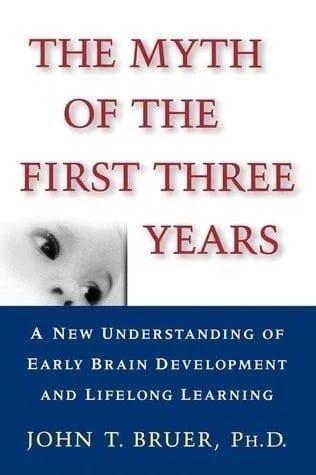The Myth of the First Three Years
The Myth of the First Three Years: A New Understanding of Early Brain Development and Lifelong Learning challenges one of the most popular ideas in modern parenting and early childhood education: that the first three years of a child’s life are critical for brain development and set the stage for lifelong success.
Author John Bruer argues that this notion, while rooted in neuroscientific findings, has been oversimplified and misinterpreted by educators, policymakers, and parents. Instead, he makes the case that learning and brain development are lifelong processes, not limited to early childhood.
Bruer’s ability to dissect scientific studies and clarify what they actually reveal about brain development makes this book an interesting read. He critiques the overuse of phrases like “critical windows of opportunity” and challenges the fear-mongering that has led many parents to believe that they must cram in enrichment activities during the toddler years, or risk irrevocably harming their child’s future.
By unpacking the science, Bruer reassures parents that human brains remain adaptable throughout life, and opportunities for learning extend well beyond the first three years.
The author also explores how this “first three years” myth has shaped public policy and early childhood education programmes. He argues that while early interventions can be helpful, they are not the sole determinant of a child’s future success. This makes his book not only relevant to parents but also to educators and policymakers who want to base decisions on a more accurate understanding of the science. Bruer emphasises the importance of fostering lifelong learning environments rather than narrowly focusing on infancy and toddlerhood.
While the book offers a refreshing counterpoint to conventional wisdom, you may find Bruer’s scientific explanations dense and occasionally academic. Still, his meticulous attention to research and his thoughtful critique of popular misconceptions make this book a valuable resource for those looking for a deeper understanding of child development. It encourages readers to think critically about what they hear in the media and challenges the cultural tendency to overemphasize the early years.
Our aim is to help our children discover their talents, realise their full potential, and develop a passion for life-long learning.






